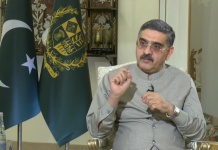ISLAMABAD: The Asia-Pacific Group (APG) — a regional affiliate of the Financial Action Task Force (FATF) — has expressed dissatisfaction over Pakistan’s inadequate compliance with global commitments against terror financing.
After three-day mutual evaluation, APG pointed out conflicting situations and poor coordination among stakeholders to curb money laundering and terror financing.
Although no official statement was issued from the APG or the government on the conclusion of the on-site mutual evaluation but sources said that the APG flashed poor coordination among law enforcement agencies (LEAs) at different tiers of the government and lack of cooperation of certain intelligence agencies with such LEAs.
The APG also highlighted the government agencies did not have “risk-based approach” to take actions against anti-money laundering (AML) or counter-terror financing (CFT) and mostly operated on a pressure basis.
The other contradictory situations highlighted by the visiting delegation include, for instance, the Pakistani narrative that mosques and religious institutions were not involved in terrorism, but it was confronted with the data showing most of the punishments and fines imposed on those collecting donations and delivering speeches around mosques and religious institutions like madrassahs.
Although, no indication was found about those punished or fined for collecting donations had any link with the militant organisations like Al-Qaeda or those accused of cross-border terrorist organisation and proscribed organisation. But the visiting delegation remains hugely dissatisfied with it.
According to our sources four detailed sessions with the Pakistani delegation led by the director general of Financial Monitoring Unit (FMU) were held on concluding day. The sessions included presentations by the Securities & Exchange Commission of Pakistan (SECP) and the Ministry of Foreign Affairs over international cooperation and information sharing for financial intelligence along with evidences and agreements signed with various countries to share information regarding immigrants and workers.
In another session, the SECP explained steps regarding enforcement and supervision of the AML/CFT regime in financial institutions, exchange companies and non-banking financial companies. The concluding session discussed confiscations of proceeds of crimes relating to the AML/CFT regime.
The officials noted that no formal warning on the conclusion of the mutual evaluation was given to Pakistani stakeholders. The delegation will finalise its report later and Pakistan will also submit a report to FATF within three weeks. Both reports will be reviewed by FATF in May and decision will be made in June if Pakistan falls into Black list or if it can move out of the grey list by September
The officials think diplomatic efforts and geo-political considerations will be affect immensely.















